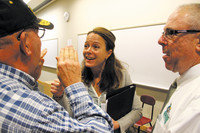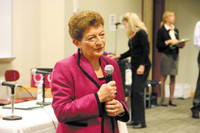The future of the Community College of Rhode Island (CCRI) was brought into question Friday afternoon as the three presidential candidates, Dr. Meghan Hughes, Dr. Brenda Dann-Messier and Dr. Jean …
This item is available in full to subscribers.
We have recently launched a new and improved website. To continue reading, you will need to either log into your subscriber account, or purchase a new subscription.
If you are a current print subscriber, you can set up a free website account by clicking here.
Otherwise, click here to view your options for subscribing.
Please log in to continue |
|



The future of the Community College of Rhode Island (CCRI) was brought into question Friday afternoon as the three presidential candidates, Dr. Meghan Hughes, Dr. Brenda Dann-Messier and Dr. Jean Wihbey, participated in an open forum presenting their visions for the state’s only community college.
The position opened up earlier this year when current president Ray Di Pasquale announced he would not seek to renew his contract as president. Governor Gina Raimondo and Post-secondary Education Chair William Foulkes created a search committee to review applications in July.
Foulkes, at Friday’s forum, which was hosted at the Knight Campus with faculty, staff and students present, said it would be a “big task” to replace Di Pasquale but was happy to report there are three “great candidates.”
The candidates have varying backgrounds ranging from legislative, academic and nonprofit sectors. All are women.
Hughes, 49, received her undergraduate degree from Yale and her Ph.D. in art history from New York University. From 2003 to 2009 Hughes worked as a lecturer at Tufts University in Boston before becoming executive director of Year Up, a national non-profit that provides low-income students with a year training program including college credits, corporate internships and skill development. Under her leadership Year Up’s program has doubled in size.
“I have taken a different career path than the others, but I hope to take up the baton and continue moving this institution forward,” Hughes said. “I have a different set of eyes, experience and perspective. I can trust the team to lead where they are the experts.”
After receiving her undergraduate degree from Rhode Island College and Ed.D. from Johnson & Wales, Dr. Brenda Dann-Messier, 66, began her career in higher education at CCRI from 1974 to 1993. She then left to serve in the education department of the Clinton administration. Dann-Messier served as the president of Dorcas Place Adult and Family Learning Center from 1999 to 2009. In 2009 President Obama appointed her to assistant secretary of education for vocational and adult education. Then she was also named acting assistant secretary for post-secondary education. She remains a faculty member and trustee of Johnson & Wales University.
She said, “I have a long-time affiliation with and affection for CCRI.”
Dr. Jean Wihbey, 54, has spent the majority of her career working in several community colleges, moving up the leadership ladder. She received her undergraduate degree from Fairfield University, a master’s from Southern Connecticut State University and a doctorate in educational psychology from the University of Connecticut. She currently serves as provost of Palm Beach State College since 2009.
“As the only community college in the state, you have great opportunity to make a big impact in the lives of so many,” Wihbey said. “I have a lot of experience, and I would love to bring it here.”
Those in attendance asked all of the candidates their opinion on Governor Raimondo’s vision of CCRI at the center of economic development, focusing on vocational programs and providing a pipeline of skilled workers for the state’s businesses, in fear the college may lose sight of their liberal arts education.
All of the candidates agreed that CCRI should be able to do both, and do both well.
“The governor is not going to be the next president of CCRI,” Hughes said. “The humanities are how you learn. Employees want people who can speak up, collaborate with others and be innovative. Liberal arts should remain at the heart of the school. I don’t see polarizing those educations you need both.”
Dann-Messier agreed saying it wasn’t an “either or” question, but that the college should meet each student where they are and provide access to both types of learning.
“As a community we need to let students know this is the first step in education, expose and encourage students to all options,” she said.
Wihbey noted that as a public institution CCRI “exists for the benefit of the public” and has an obligation to meet the needs of the community whether that is economic development or providing the beginnings of education for transfers to four-year colleges.
Barbara Cottam, chair of the Rhode island Board of Education, said she also sees CCRI as having a “dual purpose” preparing students for four-year institutions as well as preparing them to enter the workforce “ready and trained” for well paying jobs.
“This school needs to meet students where they are,” she said. “Equip students with the technical skills, but also with the skills from the humanities, the ability to think and problem solve. Create curious lifelong learners.”
Another concern of those in attendance was remediation and developmental courses and how students can be better prepared for college courses. Hughes, Dann-Messier and Wihbey agreed that how remediation is handled must be reimagined but differed on how.
Dann-Messier suggested a six-month “boot camp” to bring students up to an academic level for college courses. Similarly, she hopes to better assess incoming students, using multiple meters for deciding their ability to enter into college courses.
Hughes said in Denver, Colorado there has been a lot of success in getting rid of remedial courses altogether and would be open to implementing a similar program here. The school could partner with secondary schools to identify those students who would need remediation and see that they have appropriate classes in 12th grade with 24/7 tutoring and increased student support at the college level. This way, students wouldn’t have to use up their Pell grants and financial aid on developmental courses, which can “discourage” many students from continuing their education.
Where Dann-Messier and Hughes suggested different remedial strategies altogether, Wihbey couldn’t see doing away with developmental courses, rather believes they could be taken alongside regular college courses.
If nothing else, all the candidates agreed that they wanted to ensure CCRI wasn’t just the largest community college in New England, but also the most successful.
Hughes said she wants to see CCRI nationally recognized for high transfer and graduation rates by 2020, with a culture focused on excellence, support, innovation and feedback. She hopes to lead by example, and as someone “with a deep respect for teachers” she plans to be a “relentless advocate” for them.
“We need to become outcome-focused and data-driven,” Dann-Messier said. “Community colleges should be a beacon of hope and possibility.”
Wihbey believes that leaders have “believers, not followers” and would work to be an inspiration and motivator for the CCRI community.
“The objective for my presidency would be to ensure the story of CCRI is the story of excellence,” Wihbey said.
The Board of Education is expected to make a selection at their next meeting on Dec. 2.
Comments
No comments on this item Please log in to comment by clicking here